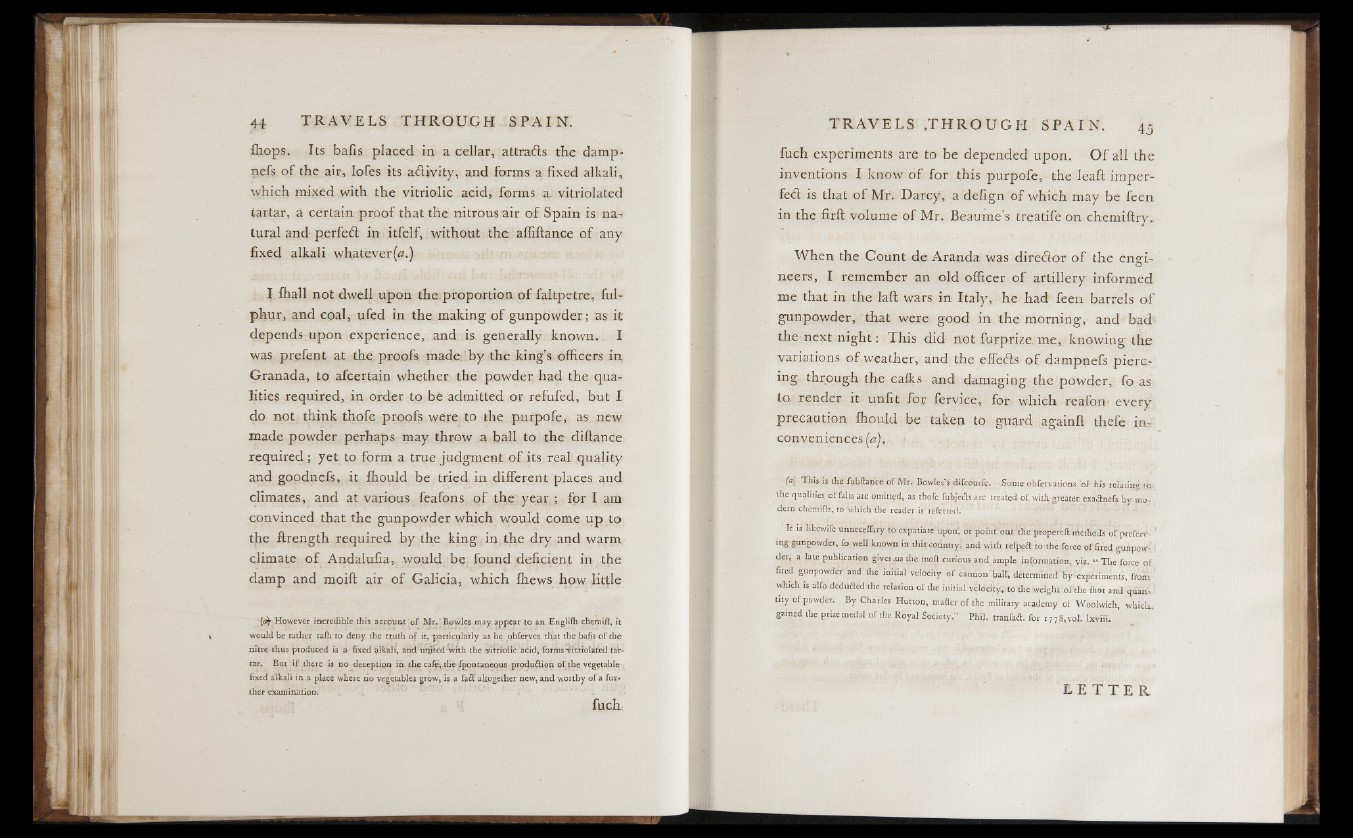
ffiops. Its bails placed in a cellar, attra&s tbe damp-
nefs of the air, lofes its a<51ivity, and forms a fixed alkali,
which mixed with the vitriolic acid, forms a vitriolated
tartar, a certain proof that the nitrous air o f Spain is na-^
tural and perfect in itfelf, without the afliitanee of any
fixed alkali whatever^.)
I ffiall not dwell upon the. proportion of faltpetre, ful-
phur, and coal, ufed in the making o f gunpowder; as it
depends upon experience, and is generally known. I
was prefent at the proofs made by the king’s officers in
Granada, to afcertain whether the powder had the qualities
required, in order to be admitted or refufed, but I
do not think thofe proofs were to the purpofe, as. new
made powder perhaps may throw a ball to the diilance
required ; yet to form a true judgment of its real quality
and goodnefs, it ffiould be tried in different places and
climates, and at various feafons of the year,; for I am
convinced that the gunpowder which would come up to
the itrength required by the king in the dry and warm
climate o f Andalufia, would be found deficient in the
damp and moift air of Galicia, which fhews how little
However incredible, this accpunt of Mr.’ Bowles may appear to an Englifh chemift, it
would be rather raih to deny, the truth of it, particularly as he obferves that the bafis of the
nitre thus produced is a fixed alkali, arid united with the vitriolic ‘¿cid, forms 4 itriolated taV-
tar. Bur if there is no deception in the cafe, the fpontaneous produ&ion of the vegetable
fixed alkali in a place where rio vegetables grow» is a few altogether new, and worthy o f a further
examination.
fuch
fuch experiments are to be depended upon. O f all the
inventions I know of for this purpofe, the Ieaft imper-
fed is that o f Mr. Darcy, a defign of which may be feen
in the firft volume of Mr. Beaume’s treatife on chemiftry.
When the Count de Aranda was diredor o f the engineers,
I remember an old officer o f artillery informed
me that in the laft wars in Italy, he had feen barrels o f
gunpowder, that were good in the morning, and bad'
the next night: This did not furprize.me, knowing the
variations o f weather, and the effeds o f dampnefs piercing
through the calks and damaging the powder, fo as
to, render it unfit foy fervice, for which reafon- every
precaution ffiould be taken to guard again!! thefe ¡inconveniences
(«).
(a) This is the fubftance o f Mr. Bowles’s difcourfe. Some obfervations o f his relating to-
the qualities o f falts are omitted, as thofe, fubje&s are treated of, with, greater exa&nefs by modern
chemills, to which the reader is' referred.
It is likewife unneceflary toexpatiate upon; or poiht out the propereft methods o f preferv- ‘
mg gunpowder, fo well known in this country; and with refped to-the force of fired gunpow, |
der, a late publication gives .us the moil curious and ample information, viz. “ The force of
fired gunpowder and the lntiial velocity o f cannon' ball;, determined by-experiments, from
which is alfo deduiledthe relation of the initial velocity,,to the weight ofthe ihot and quan,
tity of powder. By Charles Hutton, mailer o f the military academy of Woolwich, which,
gained the prizemedai of the Royal Society." Phil, tranfafl. for 1778,vol. lxviii.
L E T T E R